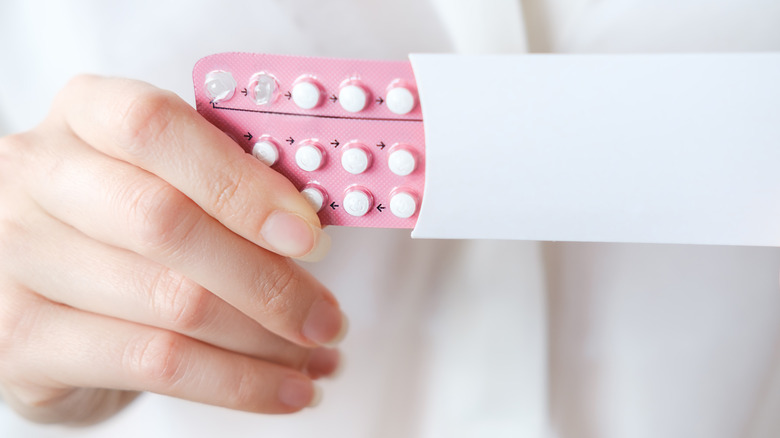Birth Control Options That Are Safe If You Have High Blood Pressure
For those who either have high blood pressure or are concerned that they may develop hypertension over time, there is a concern about whether or not to avoid birth control methods that are hormonal. However, according to WebMD, it's okay to take certain hormonal birth control methods if you have hypertension, as long as you're careful and consider such factors as your overall health.
According to the Mayo Clinic, oral contraceptives contain two hormones, estrogens, and progestins, which work to prevent pregnancy by preventing the egg from developing fully, thus preventing fertilization. The estrogen and progestin present in hormonal birth control methods, however, may negatively affect the cardiovascular system and impact blood pressure (via UpToDate). Harvard Medical School also notes that hormonal birth control containing estrogen or progestin can elevate blood pressure. Additionally, those who are already hypertensive and then use hormonal birth control methods have a greater risk of heart attack or stroke. However, these effects are contingent on what drug you're taking, the dosage, and the delivery method, per UpToDate.
Hormonal birth control methods can elevate your blood pressure
The three birth control methods that can contribute to elevated blood pressure are birth control pills, skin patches, and the vaginal ring. According to WebMD, birth control pills that offer a higher hormone dose may increase blood pressure rates more than those that offer a lower dose, but there is still more research to be done.
For those with high blood pressure looking to take birth control with estrogen, the Journal of the American Medical Association (JAMA) recommends taking into consideration your age, how your manage your blood pressure, and any other potential risks for heart disease. For those who are under 35 and have their blood pressure under control, it is generally considered safe to use estrogen-containing birth control (via Harvard Medical School). However, before starting any birth control regimen, you should meet with your doctor and have your blood pressure checked. You should also continue monitoring your blood pressure routinely. Those who are 35 and older should not consider birth control methods that use estrogen, regardless of blood pressure status.
There are alternative methods you can consider
One hormone that is present in birth control pills is drospirenone, whose diuretic qualities may help to lower blood pressure, according to the American Heart Association. There is also a contraceptive implant, which is a matchstick-sized plastic rod that is inserted into the arm, according to the Mayo Clinic. It releases a low dose of progestational hormones, which thins the lining of the uterus.
However, if you have high blood pressure, there are other forms of birth control you can turn to that don't contain estrogen. These include intrauterine devices, condoms, or the diaphragm (via Harvard Medical School). If you wish to take a pill, however, and your blood pressure is under control, a pill that has less than 35 micrograms of estrogen may be an option for you (via WebMD). If you decide to go that route, you will need to make sure you check your blood pressure within four weeks of starting your birth control regimen. Regardless of which method you choose, it's a good idea to consult with your doctor to make sure that you're making the healthiest birth control choices for your lifestyle and your body.



